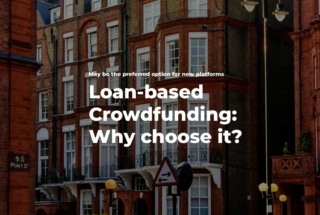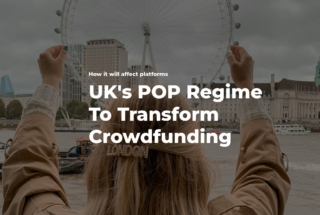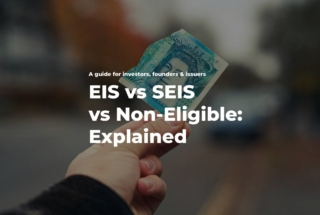Crowdinvesting in Austria: Market Overview
No time to read? Let AI give you a quick summary of this article.
The Austrian crowdfunding market operates under two primary regulatory frameworks: the national Alternative Financing Act (AltFG) and the European Crowdfunding Service Providers Regulation (ECSPR).
What you will learn in this post:
National framework: Alternative Financing Act (AltFG)
Investment platforms operating under the AltFG1 are confined to the Austrian market. This framework is used by smaller, local platforms that do not offer transferable securities.
The AltFG imposes financial and disclosure requirements where issuers can raise up to EUR 2 million per 12 months, may either need to provide a full capital market prospectus or a shorter information document under certain volumes.
The FMA does not supervise AltFG platforms; instead, local trade authorities oversee them, which may simplify the regulatory burden for these platforms.
European Framework: ECSPR
Crowdfunding platforms that want to work with issuers who can raise EUR 5 million in a 12 month period, need to comply with the European Crowdfunding Service Providers Regime — ECSPR2. Such investment platforms are supervised by the Austrian Financial Market Authority (FMA) and are permitted to provide one or several services, depending on their authorization level:
- Receiving and transmitting orders for transferable securities (physical, tokenized, or in the form of loans)
- Placing of transferable securities without a commitment from the platform
- Loan mediation
- Individual management of loan portfolios.
The threshold for a project owner is established at EUR 5 million per year, and all the services shall be provided on primary markets only. An ESCP-licensed provider is allowed to establish secondary market platforms but these platforms mustn’t function as exchanges or brokers, so no matching or trading by the platform itself is permitted. Instead, these platforms can function only as bulletin boards that help buyers and sellers find each other.
Having a license only is not sufficient for crowdfunding platforms or the so-called crowdinvesting plattformen to operate. There are some other requirements that shall be complied with, otherwise, platforms may be fined.
For each crowdfunding offering, a project owner is required to publish a Key Investment Information Sheet (KIIS) where he shall provide information about the project owners, the rights and fees for investors, risks, and the type of instrument offered. The KIIS is not checked nor is it approved by the FMA. However, if securities or investments are offered without a prospectus, the FMA may impose penalties.
For offering securities without a prospectus, the maximum fine is EUR 700,0002, and for offering investments without a prospectus, the maximum fine is EUR 100,000.
Crowdinvesting plattformen are not permitted to receive any payments to their accounts. Instead, they shall use the services of authorized payment service providers in accordance with the Payment Services Act. A platform is permitted to hold accounts for customers only if it has authorization to operate as a credit institution in accordance with the Austrian Banking Act.
All marketing content distributed by the platform shall be clear and not misleading, and be available in German.
A crowdinvesting platform is allowed to receive only EUR 5,000 per year3 from accredited investors unless an investor makes a separate declaration.
Transferable securities and tokenization
The ESCP operators shall be very cautious with tokenized assets. If a platform uses blockchain technology to create digital instruments in the form of tokens, it shall clearly understand what type of instruments will be used. Here are some examples of such instruments:
- Bonds
- Participation rights
- An indivisible share
- Joint ownership
- Derivatives of cash flows
Tokenization standardizes assets and makes them easily transferable. This is why some instruments that are not securities may turn into securities when they are tokenized.
For example, some real estate crowdinvesting platforms, also known as immobilien crowdinvesting plattformen offer tokenized real estate. In such a case, they form a cash flow around a project (real estate) that is not operationally active, and thus, tokens may be considered securities4 by regulation.
Offering securities requires licensing, and it is not only an ESCP license. New crypto regulation was introduced for the European Union, and along with being a crowdfunding service provider, a platform may be required to get a license as a token issuer4.
The cryptocurrency market in Austria is also supervised by the FMA5. The regulator has already drawn a detailed information document6 that can be used as a guide for companies that need to get a license. The provisions for crypto-asset service providers will apply starting from 30 December 20245.
Top crowdinvesting platforms in Austria
Meanwhile, crowdfunding in Austria continues to develop, and here are its major players.
Rendity
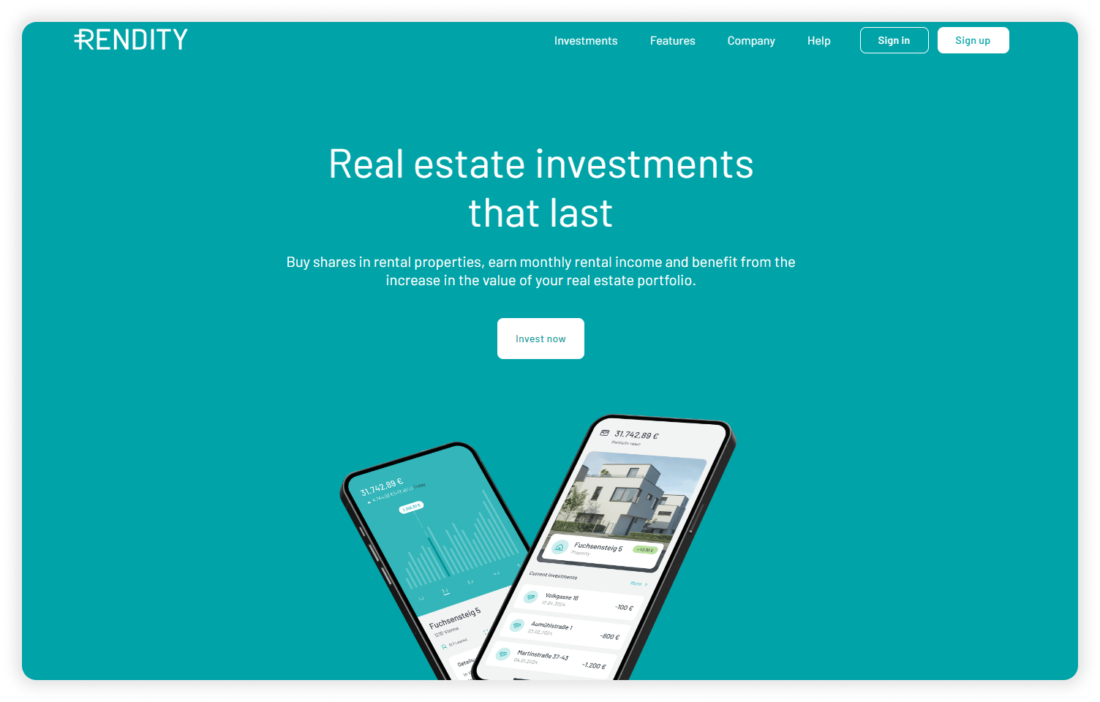
Rendity7 operates in Austria, Germany, and Switzerland. The platform allows investors to buy shares in rental property to get rental income and benefit from the property appreciation.
This is an equity- and debt-based platform with an average loan duration of 19 months. The advertised return rate is 8.5%, and all the shares are registered in the land register.
The platform allows everybody to invest with just EUR 100.
One of the main Rendity’s benefits is its dedication to providing investors with the top-safe investment environment. The platform offers a deposit protection of up to EUR 100,000.
Rockets
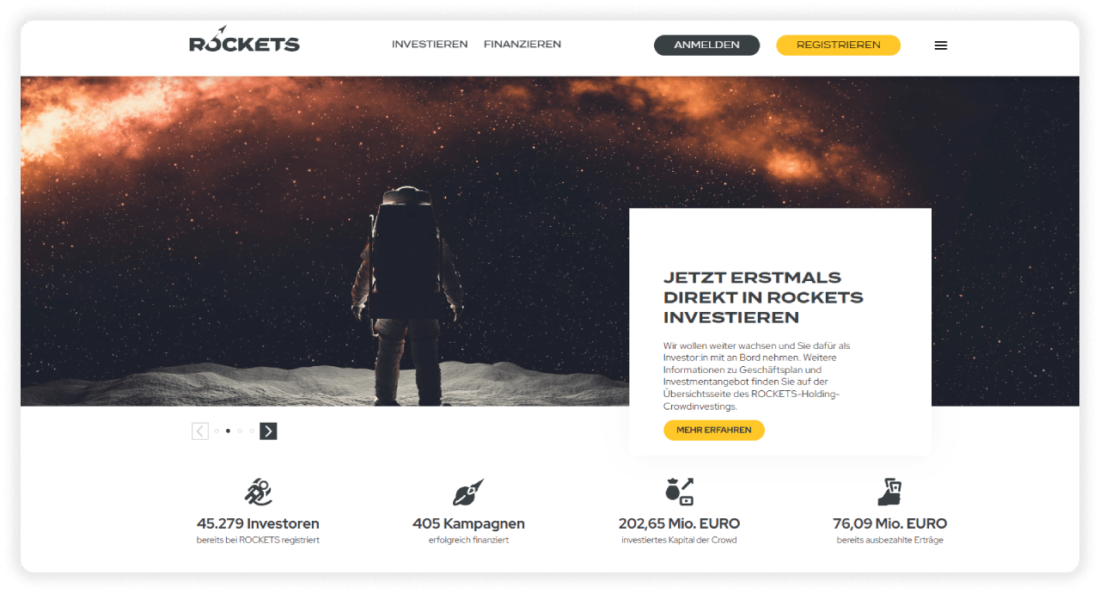
Rockets8 is a debt-based crowdinvesting platform launched in 2013. It operates in Austria and Germany and allows investing with a minimum of EUR 250. The advertised return is 6%.
On the platform, investors can select among three options:
- Investing in real estate projects from developers with years of experience
- Investing in innovative business models to help solve environmental problems
- Investing in promising small- and medium-sized companies.
Everybody who is of legal age and domiciled in Austria or Germany can participate in the offerings.
BetonGold

BetonGold9 was launched in Austria in 2016 as a debt-based real estate investing platform. The platform allows investing in top-tier real estate with just EUR 500, and the advertised return varies from 5.25 to 7% depending on the property type.
Conda Capital GMBH

Conda Capital GMBH10 is an equity- and debt-based crowdinvesting platform that allows investing in European mid-sized businesses. With over 10 years of experience, the platform helped over 50,000 investors to invest in more than 330 projects. The total investment capital is for now more than EUR 222 million.
Everybody can participate in offerings with as little as EUR 250, the advertised return is 7%. The platform works with such investment instruments as stocks, bonds, participation certificates, convertible bonds, and hybrid investment products.
Recrowd
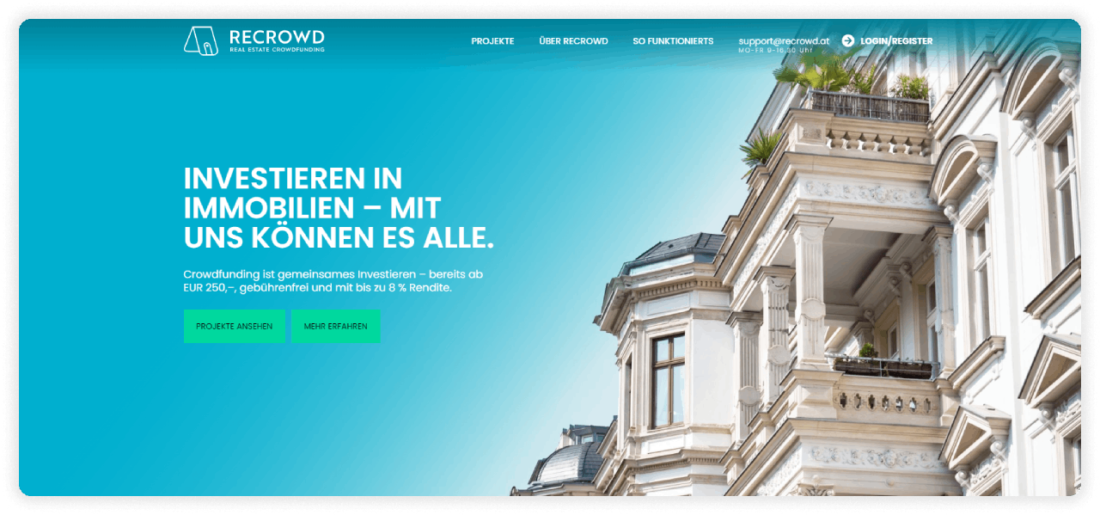
Recrowd11 is a debt-based real-estate crowdinvesting platform launched in 2018. The minimum investment on the platform is EUR 250, and the advertised profit rate is 8%. Almost EUR 90 million were invested through the platform, and over EUR 949,000 were already repaid to investors.
Bottom line
Considering the development of the Austrian crowdfunding market, it may be the right time now to launch your own crowdinvesting platform in the region.
To speed up the process and facilitate a smooth launch, you may want to consider white-label crowdfunding software from LenderKit.
Our crowdinvesting software allows you to manage P2P lending and equity fundraising operations, automate transactions via third-parties, ensure seamless document management and identity verification.
If you’d like to book a demo of the software or hop on a call with a consultant to learn more about the solution, don’t hesitate to fill in the contact form and reach out to us.

Article sources:
- Crowdfunding Service Providers - FMA Österreich
- European Crowdfunding Service Providers Regime — ECSPR
- Austrian Crowdfunding Platforms under AltFG - FMA Österreich
- Tokenisation and Crowdfunding - FMA Österreich
- FMA takes over supervision of crypto-asset service providers in Austria
- Reden wir über Aufsicht: Outsourcing von Kerndienstleistungen bei CASP
- Real Estate Investments | Rendity
- ROCKETS Investments | Crowdinvesting-Plattform
- Seite nicht gefunden - BETON.GOLD
- CONDA Capital Market I Invest direct in European SME
- RECrowd - Real Estate Crowdfunding

